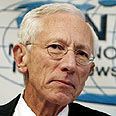
'Some banks weren't sufficiently sophisticated.' Fischer
צילום: רויטרס
Central bank chief says Israeli economy resilient
Country's conservative, tightly-supervised banking system prevented kind of collapses seen elsewhere,' Stanley Fischer tells reporters. Adds: Central bank expects to see Israeli economic growth slowing to 2.7 percent in 2009
Israel's central bank chief said Monday that the country's economy is well-positioned to weather the financial turmoil that has rocked world markets.
Bank of Israel Gov. Stanley Fischer said Israel's conservative, tightly-supervised banking system has prevented the kind of collapses seen elsewhere, while its balance of payments surplus and buoyant job market should help cushion the inevitable shock wave still to come.
Briefing journalists Monday Fischer said the central bank expected to see Israeli economic growth slowing to 2.7 percent in 2009 from around 4.5 percent estimated for this year. That still compares well to forecasts of just 0.1 percent growth next year for both the United States and the 15 European countries that use the euro.
Fischer, a former Wall Street heavyweight and senior International Monetary Fund official, said Israeli bankers had largely steered clear of risky mortgage investments and the complex financial instruments that have burned fingers elsewhere.
"In the case of some banks they owed that to successful management," he said. "In other cases maybe the banks just weren't sufficiently sophisticated to get into this. Sometimes there are advantages to not being excessively sophisticated."
'Currency's rally likely to continue'
Fischer said that between June 2003 and June 2008, the Israeli economy grew more than 5 percent each year. For all of 2008, he expects growth to slow slightly.
"This is a difficult period for every economy, including ours, but we entered this period in relatively good shape," he said. "We started at full employment, we are essentially at full employment at present ... and we started with a banking system which was much stronger than banking systems in other countries."
Fischer said he did not expect the global economic crunch to mean that financial support for Middle East peace efforts would dry up, as an agreement between Israel and the Palestinians would ultimately boost the economies of both sides and reduce the need for international aid.
"There's such an overwhelming desire around the world to get this problem dealt with," he said. "It's clear it would save money for everybody."
Asked about prospects for the US dollar, Fischer said he saw the currency's recent rally on international exchanges as likely to continue.
"It's started to correct itself, the decline in the price of oil will increase that correction substantially," Fischer said. "It's still true that if you want to put your money anywhere at this time, you'll most likely put it in US government obligations, that's the underlying source of the strength."










